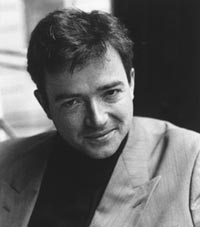|
El poema rememora al poeta
Es para el escritor, a quien yo nombro
criatura de dos pies, porque te pone
la cara a esa distancia. Logró un cálido
halo a su alrededor, con muy buena intención,
pero me temo que de corto alcance.
Lo que él comienza lo termino yo,
percibí de inmediato. Si rememoro
el toqueteo de su mano izquierda
su ánimo me convence, mas no olvido,
que el ánimo se va. En noviembre
pensar en él acaba en una voz
que afirma cuánto importa —como el viento—,
pero ninguno cambia mi expresión
y ambos mueren antes de leerme la mente.
La aldea de nieve
En tiempos de la pluma y el papel,
cuando la página era una aldea de nieve,
cuando los días que la luz iba hojeando
descendían sin ningún mensaje
el cálamo que cayó del cielo
fue la vista de la ventana de una cabaña
alumbrada por el único signo
cierto de vida, una vela,
vislumbrada por un extraño al pasar
desorientado en una aldea de nieve.
Todo lo que puede fluir puede seguir
este vislumbre, aunque ninguna imagen,
ningún rostro aparece, ni siquiera
la mano que lo cruza y lo dibuja
—aunque las cortinas cierran la visión,
aunque el extraño acaba su visita,
aunque la nieve borra todo rastro
de su estar en la aldea,
aunque sus pasos se vuelven inescrutables
y la blancura conocimiento.
The poem recalls the poet
This is for him, the writer, him I term
the creature of two feet, for he’d present
his face away. He made a warm
glow to see by, willing and well meant,
but not, I’d have to say, for the long haul.
Things he began were things I’d have to end.
I sensed immediately. When I recall
the touch of what he did with his near hand,
the mood comes over me, but the mood goes,
and that reminds me too. November days
the thought of him resolves into a voice
that states it matters now—so does the wind,
but neither moves a muscle of my face
before it dies as if it read my mind.
The snow village
In the age of pen and paper,
when the page was a snow village,
when days the light was leafing through
descended without message,
the nib that struck from heaven
was the sight of a cottage window
lit by the only certain
Sign of a life, a candle,
glimpsed by a stranger walking
at a loss through the snow village.
All that can flow can follow
that sighting, though no image,
no face appear—not even
the hand that draws across it—
though the curtains close the vision,
though the stranger end his visit,
though the snow erase all traces
of his passage through the village,
though his step become unknowable
and the whiteness knowledge.
|



